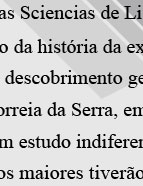

................................
The aim of the Infante was "to uncover the secrets of the islands and continents, the gulfs and inlets, veiled by the black-blue mantle of the Dark Sea." (Id., Historia...,1882, p. 170). The discoveries were not made by chance but with the aid of existing knowledge, which was progressively expanding. The navy, which had developed since the time of D. Sancho I [King Sancho I], was of great importance. When the Infante died in 1460, the navigation movement came to a halt. Oliveira Martins also highlights the conquest of Ceuta (1415) and the disaster of Tangiers (1437) in the North African enterprise. However, the occupation of fortified settlements in Morocco was an incident in national life, which "is only one episode in the great history of the overseas discoveries and conquests [...]." (Ibid., p. 188)
However, the author jumps from the Infante to the expedition of Vasco da Gama to the Orient, highlighting the expedition of Afonso de Paiva and Pêro da Covilhã. Pedro Álvares Cabral's voyage is also worthy of attention to then elaborate on D. Francisco de Almeida, Afonso de Albuquerque, and D. João de Castro. But things eventually go wrong: “Initiated anarchically, the occupation of India was, from beginning to end, an anarchistic exploration." (Ibid., p. 296) Various reasons accounted for this inability: "To explore the Orient from a commercial point of view, Dutch-style, was something our genius did not allow." (Ibid., p. 298) The presence of the Portuguese in the Orient is thus narrated. In the wake of Herculano, Oliveira Martins argues that A catástrofe [Catastrophe] (1500-1580) began during the reign of King Manuel I, followed by A decomposição [Decay] (1580-1640) and resulted in A anarquia espontânea [Spontaneous anarchy] (1777-1826).
Special attention to colonisation was still lacking but would come later, in another work - O Brasil e as colónias portuguesas [Brazil and the Portuguese colonies]. The distinction between colonisation and trade is central to this work- agricultural colonisation in the unoccupied Atlantic Islands in contrast with the populated African coastlines. But also in Africa and Brazil the attraction to the inland areas, the "exploration of the hinterlands", to discover precious metal mines and retain the workforce (O. Martins, O Brazil..., 1920, pp. 16-19). Brazil was gone, it was independent, and what mattered now was the African continent: where there might still be a "possible future" but a "doubtful present" (Ibid., p. 198). This was where history was not always the most useful tool for analysis. "While in Africa they [the Portuguese] were already drawn to the inland to hunt down negroes, before going in search of mines, the same occurred in America, where the bandeiras [expeditions] trailed the hinterlands to capture Indians." (Ibid., p. 19)
